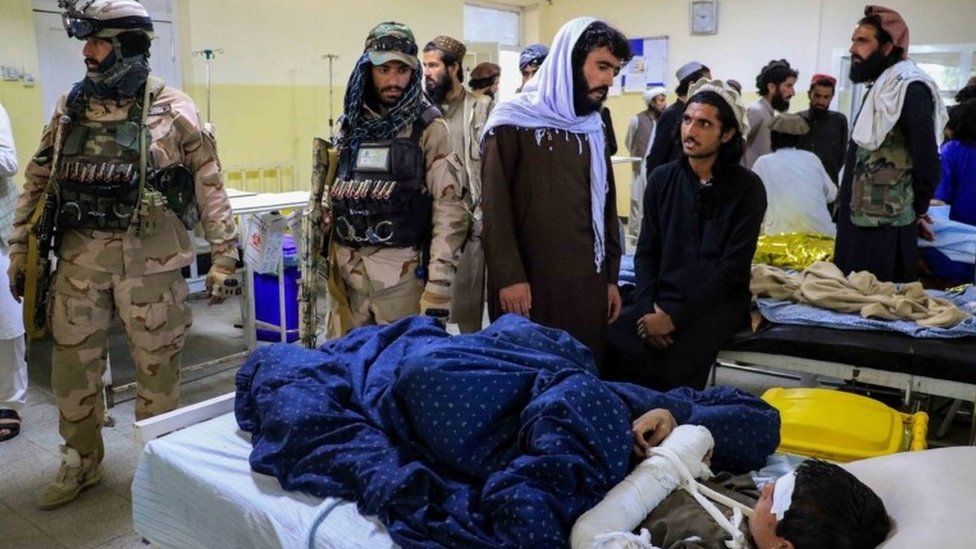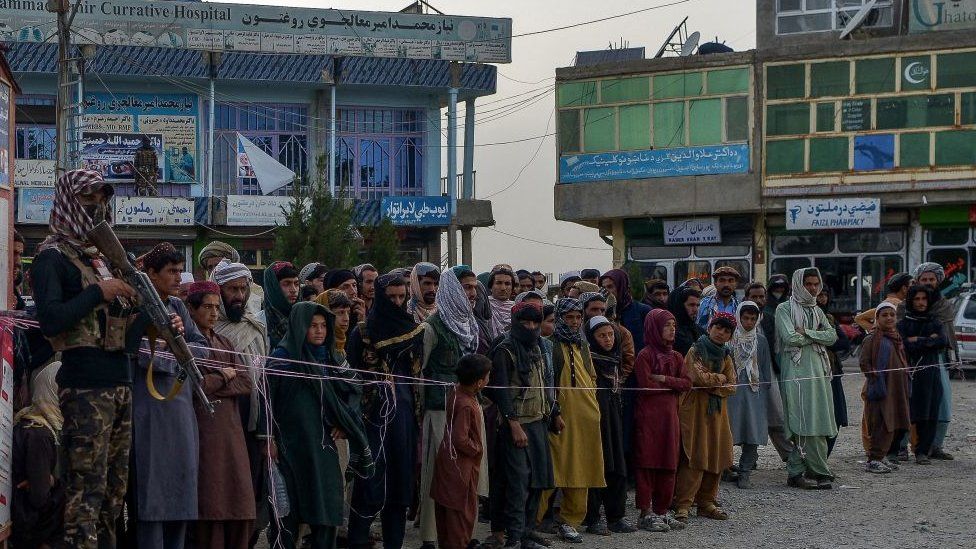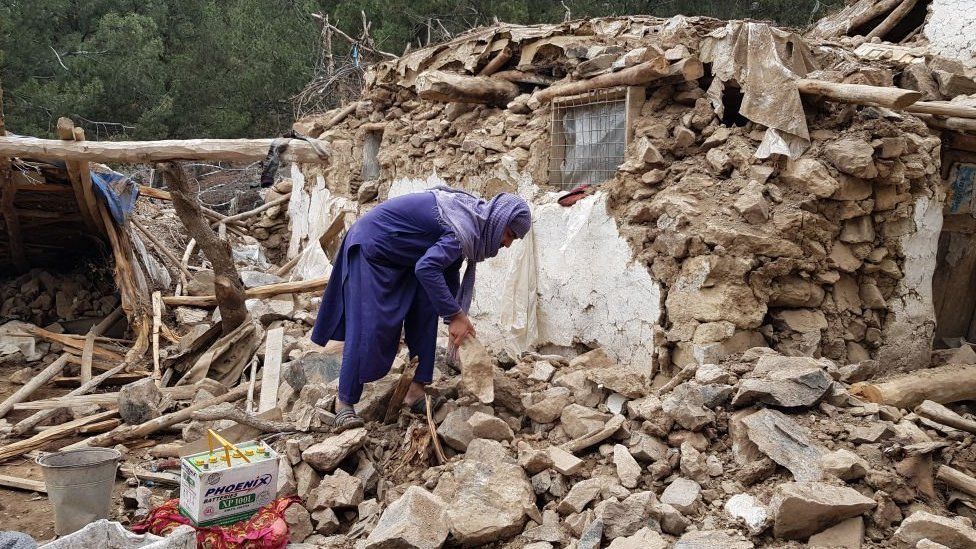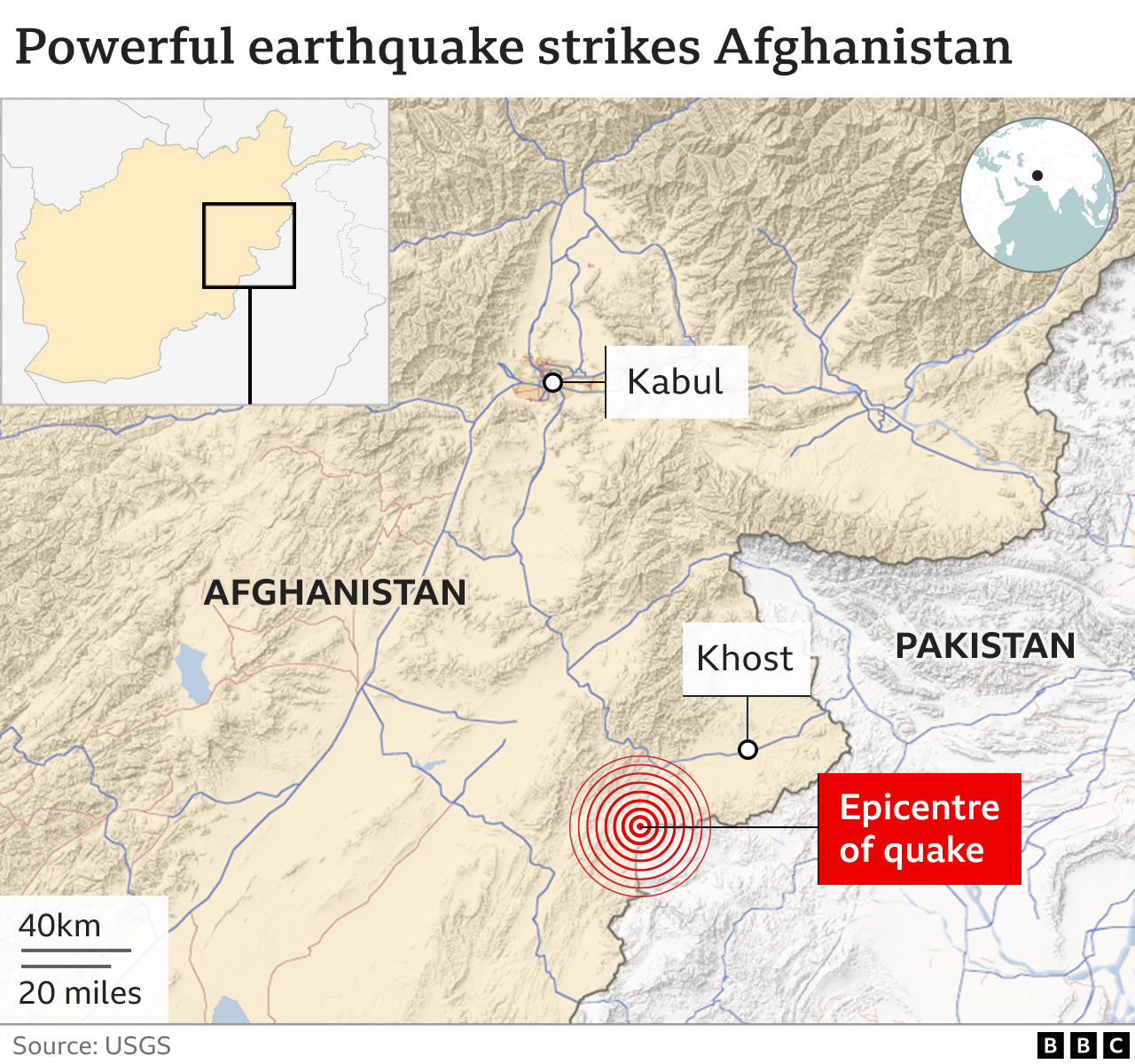Afghan earthquake: At least 1,000 people killed and 1,500 injured
Leo Sands and Malu Cursino - BBC NewsA powerful earthquake has killed at least 1,000 people and injured 1,500 in eastern Afghanistan, an official of the ruling Taliban told the BBC.
The Taliban appealed for international help for the rescue effort as pictures showed landslides and ruined mud-built homes in the province of Paktika.
The quake struck shortly after 01:30 (21:00 GMT Tuesday) as people slept.
Hundreds of houses were destroyed by the magnitude 6.1 event, which occurred at a depth of 51km (32 miles).
It is the deadliest earthquake to strike Afghanistan in two decades and a major challenge for the Taliban, the Islamist movement which regained power last year after the Western-backed government collapsed.
The earthquake struck about 44km from the city of Khost and tremors were felt as far away as Pakistan and India. Witnesses reported feeling the quake in both Afghanistan's capital, Kabul, and Pakistan's capital, Islamabad.
Taliban officials asked the UN to "support them in terms of assessing the needs and responding to those affected", Sam Mort from Unicef's Kabul unit told the BBC.
The UK's special representative to Afghanistan, Nigel Casey, said the UK was in touch with the UN and was "ready to contribute to the international response".
Earthquakes tend to cause significant damage in Afghanistan, where dwellings in many rural areas are unstable or poorly built.
Speaking to Reuters news agency, locals described horrific scenes of death and destruction in the aftermath of the late-night earthquake.
"The kids and I screamed," said Fatima. "One of our rooms was destroyed. Our neighbours screamed and we saw everyone's rooms."
"It destroyed the houses of our neighbours," Faisal said. "When we arrived there were many dead and wounded. They sent us to the hospital. I also saw many dead bodies."
"Every street you go, you hear people mourning the deaths of their beloved ones," a journalist in Paktika province told the BBC.
Local farmer Alem Wafa cried as he told the BBC that official rescue teams had yet to reach the remote village of Gyan - one of the worst hit.
"There are no official aid workers, but people from neighbouring cities and villages came here to rescue people," he said. "I arrived this morning, and I - myself - found 40 dead bodies."
Most of the dead, he said, were "very young children". The local hospital just did not have the capacity to deal with such a disaster, the farmer added.
In remote areas, helicopters have been ferrying victims to hospitals.
Even before the Taliban takeover, Afghanistan's emergency services were stretched to deal with natural disasters - with few aircraft and helicopters available to rescuers.
Speaking to the BBC, a doctor in Paktika said medical workers were among the victims.
"We didn't have enough people and facilities before the earthquake, and now the earthquake has ruined the little we had," they said. "I don't know how many of our colleagues are still alive."
Communication following the quake is difficult because of damage to mobile phone towers and the death toll could rise further still, another local journalist in the area told the BBC.
"Many people are not aware of the well-being of their relatives because their phones are not working," he said. "My brother and his family died, and I just learned it after many hours. Many villages have been destroyed."
Most of the casualties so far have been in the Gayan and Barmal districts in Paktika, a local doctor told the BBC. Local media site Etilaat-e Roz reported a whole village in Gayan had been destroyed.
There were no immediate reports of casualties or significant damage in Pakistan, according to BBC Urdu.
Decades of conflict have made it difficult for the impoverished country to improve its protections against earthquakes and other natural disasters - despite efforts by aid agencies to reinforce some buildings over the years.
Afghanistan is prone to quakes, as it's located in a tectonically active region, over a number of fault lines including the Chaman fault, the Hari Rud fault, the Central Badakhshan fault and the Darvaz fault.
Over the past decade more than 7,000 people have been killed in earthquakes in the country, the UN's Office for the Co-ordination of Humanitarian Affairs reports. There are an average of 560 deaths a year from earthquakes.
Most recently, back-to-back earthquakes in the country's west in January killed more than 20 people and destroyed hundreds of houses.

Afghanistan: The basics
- The Taliban run the country: The hardline Islamists took over Afghanistan last year, almost 20 years after being ousted by a US-led military coalition
- There's a food crisis: More than a third of people can't meet basic needs and the economy is struggling, as foreign aid and cash dried up when the Taliban took power
- Women's rights are restricted: They have been ordered to cover their faces in public and teenage girls have not been allowed to go to school
Read more about Afghanistan
Video: People injured in the earthquake are rushed to a rescue helicopter











 by
by 

 61-BLUES
61-BLUES
